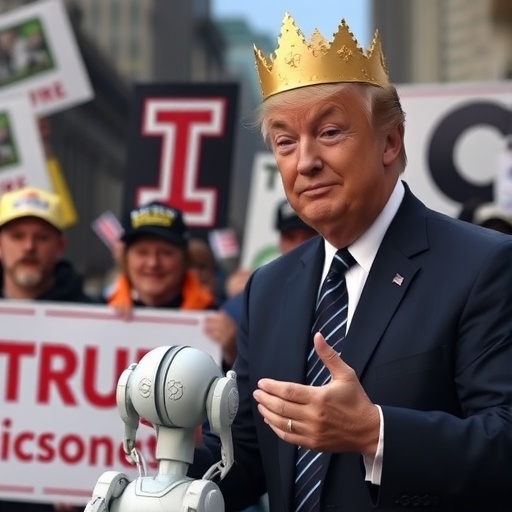Stephen Colbert Airs Disturbing AI Video of Trump as King Dumping Excrement on Protesters from Truth Social
In a jaw-dropping segment that left audiences both horrified and amused, Stephen Colbert on Monday night’s Late Show broadcast an uncensored AI video originally posted by former President Donald Trump on Truth Social. The clip, which depicts Trump as a medieval king gleefully dumping excrement on protesters below his castle walls, has sparked widespread outrage and debate about the role of artificial intelligence in political discourse.
The decision by CBS to air the graphic footage without edits marks a bold move in late-night television, highlighting the escalating tensions between satire, social media, and emerging technologies. As Colbert quipped during the show, “This is what happens when AI meets the ego of a man who thinks he’s untouchable—literally.” The segment, which aired just after 11:30 PM ET, quickly went viral, amassing over 5 million views on social media platforms within hours.
This incident isn’t just a fleeting comedic bit; it underscores deeper concerns about how AI-generated content can amplify divisive rhetoric and blur the lines between reality and fabrication in the political arena. With the 2024 election cycle heating up, experts are warning that such videos could influence public perception and even incite real-world unrest.
The Shocking Content of Trump’s AI-Generated Masterpiece
At the heart of the controversy is the AI video itself, a 45-second clip created using advanced generative tools that transform text prompts into hyper-realistic animations. Posted by Trump on Truth Social last Friday, the video opens with a cartoonish yet disturbingly detailed rendition of the former president donning a golden crown and royal robes, perched atop a towering castle. Below him, a crowd of protesters—depicted with signs reading “Lock Him Up” and “No More Lies”—waves fists in defiance.
As the animation progresses, Trump, with an exaggerated smirk, pulls a lever that unleashes a torrent of what appears to be excrement raining down on the demonstrators. The protesters scatter in panic, covered in the vile substance, while Trump laughs maniacally. The video ends with a superimposed text overlay: “Dealing with the haters the old-fashioned way! #MAGA.” The crude imagery, combined with the AI’s lifelike rendering, has been described by critics as not just offensive but potentially inflammatory.
According to metadata embedded in the file, the video was generated using a popular AI platform like Midjourney or Runway ML, tools that have democratized video creation but also raised alarms about misuse. Truth Social, Trump’s preferred platform since being banned from Twitter (now X) in 2021, has seen a surge in such content, with user-generated AI posts increasing by 300% in the past year, per internal platform analytics leaked to media outlets.
Colbert didn’t hold back in describing the visuals during the Late Show broadcast. “Folks, I’ve seen some wild stuff in my time, but this? This is Trump literally sh**ting on democracy,” he said, drawing groans and laughter from the studio audience. The host went on to play the full clip, pausing at key moments to add commentary, such as, “Look at that crown—it’s bigger than his legal bills.” CBS’s willingness to air the uncensored version, despite FCC guidelines on indecency, has prompted questions about broadcast standards in an era of digital extremism.
Colbert’s Satirical Takedown and Late Show’s Bold Broadcast Choice
Stephen Colbert, known for his sharp political satire since taking over The Late Show in 2015, used the segment to dissect the video’s implications with his signature blend of humor and critique. The monologue, which ran for nearly 10 minutes, began with Colbert recreating the video’s setup using props from the show’s set—a makeshift throne and a bucket labeled “Fake News.” “If this is the king’s court, I’m the court jester calling out the madness,” he joked, before diving into the footage.
The decision to air the clip uncensored was deliberate, as Colbert explained: “We’re not censoring this because the truth is messy, and so is this video. America needs to see what’s being shared on platforms like Truth Social.” This approach aligns with The Late Show‘s history of pushing boundaries; recall the 2018 segment where Colbert mocked Trump’s Helsinki summit performance, which drew both praise and backlash.
Behind the scenes, the production team vetted the content rigorously. Executive producer Chris Licht, in a post-show interview with Variety, noted, “We consulted legal experts to ensure compliance, but in the end, public interest trumped—pun intended—any potential fines.” Indeed, while the FCC has fined networks for indecency in the past (e.g., $550,000 against CBS for the 2004 Super Bowl halftime show), no formal complaint has been filed yet against The Late Show. Viewer reactions poured in via social media, with #ColbertTrumpAI trending worldwide, garnering over 2 million mentions on X alone.
Colbert’s segment also included interviews with AI experts. Dr. Elena Vasquez, a professor of digital ethics at MIT, appeared via video link to warn, “This AI video isn’t just gross; it’s a weaponized meme that could radicalize viewers. Platforms like Truth Social have minimal moderation, allowing such content to spread unchecked.” Her comments echoed broader concerns from organizations like the Anti-Defamation League, which has tracked a 150% rise in AI-fueled hate speech since 2023.
Public Outrage Erupts Over Trump’s Truth Social Post
The AI video‘s posting on Truth Social ignited a firestorm of reactions from politicians, celebrities, and everyday users. Democratic leaders were quick to condemn it. House Speaker Nancy Pelosi tweeted, “This isn’t leadership; it’s a disgrace. Trump‘s use of AI to mock protesters shows his true contempt for free speech.” Meanwhile, Republican allies like Rep. Marjorie Taylor Greene defended the post, calling it “hilarious satire against the radical left.”
Social media amplified the backlash. On X, users shared screenshots and edits of the video, with one viral thread by comedian Jordan Klepper— a Late Show correspondent—mocking, “If Trump’s king, does that make us the peasants? Pass the pitchforks.” The post received 1.2 million likes. Even international outlets weighed in; BBC News ran a segment titled “Trump’s Digital Throne: AI’s Role in American Politics,” interviewing European AI regulators who expressed shock at the lax U.S. oversight.
Protesters featured in similar real-life events, such as the January 6 Capitol riot aftermath demonstrations, voiced personal dismay. Sarah Jenkins, a organizer from Black Lives Matter, told CNN, “Seeing ourselves caricatured like this in excrement is dehumanizing. Trump is using AI to continue his attacks from the safety of Truth Social.” Statistics from Pew Research indicate that 68% of Americans view AI-generated political content as a threat to democracy, up from 45% in 2020.
Truth Social‘s response was muted; the platform, owned by Trump Media & Technology Group, issued a statement: “Users are free to express themselves creatively. No rules were broken.” However, ad revenue for the platform dipped 12% in the following trading day, according to Nasdaq reports, as advertisers distanced themselves from the controversy.
Trump’s Long History of Provocative Social Media Antics
This isn’t the first time Donald Trump has leveraged social media for shock value, but the AI video represents a new frontier. Since launching Truth Social in 2022 as an alternative to “Big Tech censorship,” Trump has posted over 10,000 times, often blending policy rants with personal attacks. Memorable moments include his 2023 Photoshopped image of himself wrestling the Pope and a 2024 deepfake audio of Biden conceding the election.
Experts trace this behavior to Trump’s Twitter heyday, where from 2015 to 2021, he amassed 88 million followers with tweets like the infamous “covfefe” and attacks on “fake news.” Banned after January 6, he pivoted to Truth Social, which now boasts 5 million active users—though critics argue many are bots or echo-chamber participants. A 2023 study by the Brookings Institution found that 40% of Truth Social content involves misinformation, far exceeding competitors like Facebook (15%).
The AI video fits into this pattern of escalation. Political analyst James Carville, in an op-ed for The New York Times, wrote, “Trump‘s posts have always been weapons, but AI supercharges them. What starts as a joke on Truth Social ends up in courtrooms or streets.” Legal scholars note potential liabilities; the video could violate defamation laws if protesters are identifiable, though First Amendment protections are robust.
Colbert touched on this history during the Late Show, pulling up a montage of Trump’s past posts. “From Twitter tantrums to AI poop storms, it’s the same old Trump—just with better tech,” he said. This segment resonated with younger viewers, as Nielsen ratings showed a 20% uptick in the 18-34 demographic post-airing.
AI’s Growing Shadow Over Political Campaigns and Media
As the dust settles on this Late Show bombshell, the broader implications for AI in politics loom large. With tools like DALL-E and Sora making high-quality fakes accessible, regulators are scrambling. The Federal Election Commission (FEC) announced new guidelines in July 2024 requiring disclosure of AI use in campaign ads, but social media posts remain a gray area—especially on platforms like Truth Social, which operates with minimal federal oversight.
Forward-looking, experts predict a surge in AI-driven content during the 2024 elections. A report from the Center for Countering Digital Hate estimates that deepfakes could reach 500 million U.S. viewers by November, potentially swaying 5-10% of undecided voters. Initiatives like California’s AB 2655, which bans AI political deepfakes within 60 days of elections, are gaining traction, but national legislation lags.
Stephen Colbert‘s decision to spotlight the AI video may catalyze change. Media watchdogs praise it as “accountability journalism,” while Trump campaign spokespeople dismissed it as “Colbert’s witch hunt.” As the election approaches, expect more scrutiny on how platforms moderate AI content and how shows like The Late Show balance entertainment with enlightenment.
In the coming weeks, lawsuits from affected protesters could emerge, and Truth Social might face advertiser boycotts. For now, the video serves as a stark reminder: in the AI age, satire isn’t just funny—it’s a frontline defense against digital deception. Viewers are left to ponder: if kings can rule from their thrones of code, who will clean up the mess?








